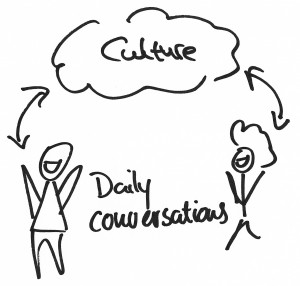
A newly minted friend in the US, William Sheldon, spoke about culture recently. He said, and I’m paraphrasing here, ‘culture is held (or staged) in conversations.‘
Culture is defined, and lived, in the way we talk about ourselves and each other; it’s found in our interactions.
Think about that for a moment. Read it again… I just did.
I found this thought to be powerful.
The Meetings After The Meeting
Culture is held in conversations. The conversations, that is, that you as a teacher-coach have with your athletes, assistant coaches, team managers, parents, administrators, and so on. But, and this is the big BUT, it’s also in the conversations that your athletes, assistants, staff, parents, administrators, and so on, have with each other – and others. This is what defines the heart and soul of your team or organization.
What’s being talked about during the drive home? When players walk out of the huddle? What’s being said in the unspoken inner voice of the athlete? In the locker room? And… the meetings after the meetings?!
Whatever is being said is what will define your team culture. And, it will let you know if those you stand next to are just on the team or into the team. Individually, each person affects the culture of the team.
You never want to allow someone else to define your culture. In business, would MacDonald’s, Coke or Gap allow the customer to define their brand? No, absolutely not. They continually do it for themselves in their conversations (e.g. commercials, customer service, point-of-sale, social media, etc.) with people.
This thought was triggered by an email exchange from some basketball coaches I work with. They’re doing some wonderful things.
I shared this story with them…
In eastern Canada, the athletes and coaches have far greater travel and financial demands because of their geography. Most would accept that they have every right to bemoan their situation because their opportunity-cost FAR EXCEEDS that of any other athlete or coach in Canada.
The problem, to me, though, was that this is where the daily conversations focused. As a result, an insidious culture or sub-culture has developed—knowingly or unknowingly. And, unbeknownst to them, they were essentially sabotaging the intention by their own efforts and actions because ownership of outcomes would always fall on someone else.
With a focus on solutions, I pointed out that their athletes were far better prepared for the demands of college and international basketball than their Canadian counterparts.
“Huh?!” Is what the look on their faces said.
“How?” They asked.
Well, a big part of being able to compete internationally stems from the ability for the athletes to travel well; that is, handle the demands of performance amidst flying, time changes, eating different foods, managing finances, climate change, time management, studying (potentially on the road). And, from a social perspective, being away from family and friends, having a roommate, travelling and being surrounded by the same group of people for an extended period of time.
They had a perfect training environment, to me!
Your Disadvantage Is Your Advantage
One coach, in an email response to me, said he enjoyed that I was keeping it positive. Positive, no. Not my intention.
It’s about building what Dick DeVenzio called an unassailable action attitude. It’s a mentality. It’s about playing the cards you’re dealt and not treating a bad hand like it’s as a crutch. It’s about an unrelenting mindset.
Can you now imagine the demonstrable change in the posture of those athletes in mere moments after their experience had been redefined for them? If they had been roosters, their chests would have puffed up, standing tall, shaking their tail feathers!
Their mindset hadn’t been changed in the moment. Their culture not revamped. But, imagine for a moment what can transpire if that’s what they truly believed about themselves and each other. If that’s what their at-the-locker talks stemmed from. Imagine if that’s how they spoke about themselves, their teammates, etc. on the ride home, in the locker room, in the quiet solitude when laying in bed at night.
Culture, and therefore, excellence, is held in conversations – both with yourself and others. Minute to minute. Hour to hour. Day to day.
What do you find yourself thinking most?
—s.
One of my favourite quotes from my mom: “Stand porter at the door of thought.“